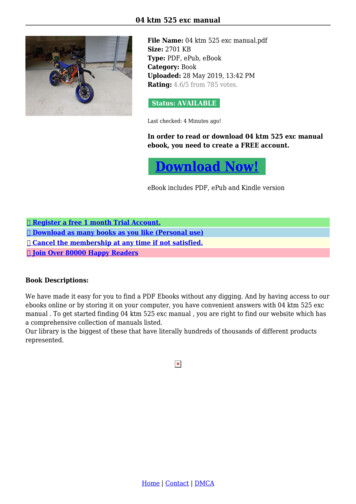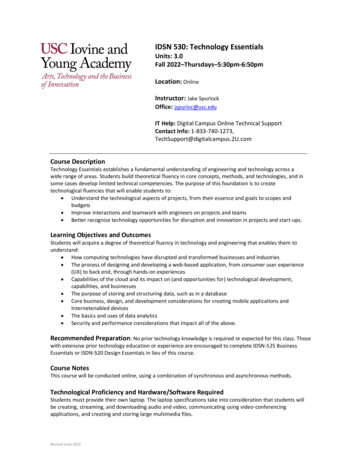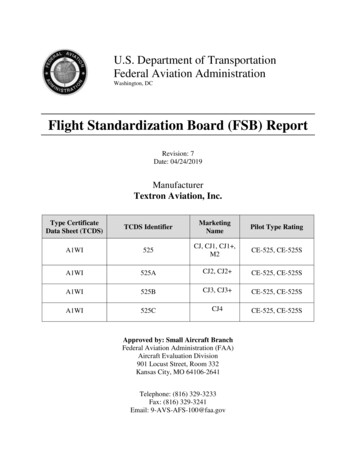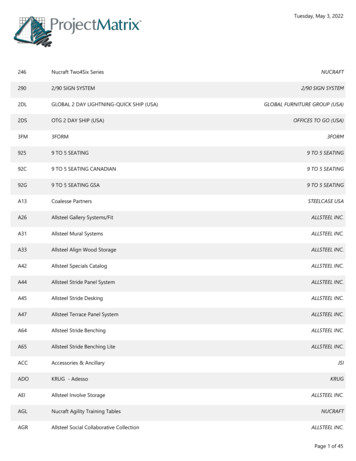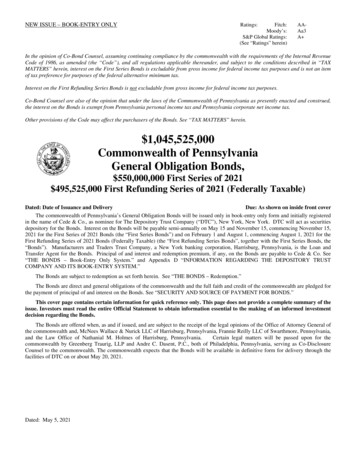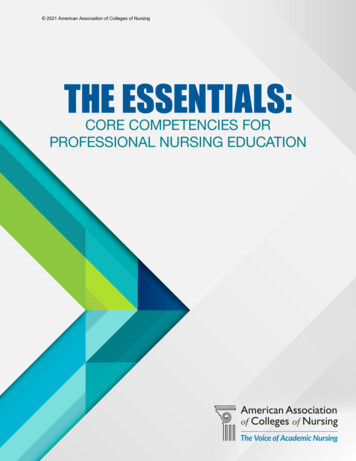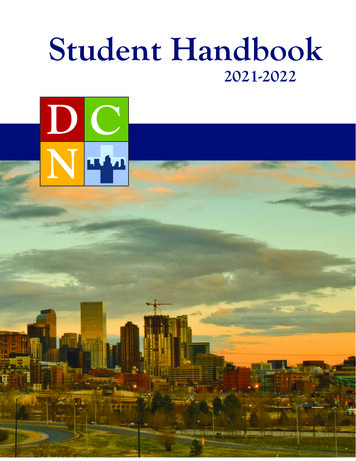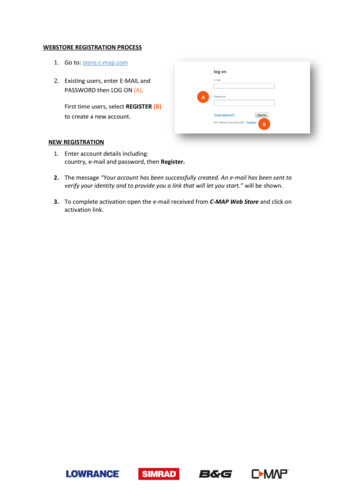
Transcription
IDSN 525: Business EssentialsUnits: 3.0Spring 2021—Tuesday—7:30 pm – 8:50 pmLocation: OnlineInstructor: Scott ArmaniniOffice: OnlineOffice Hours: By AppointmentContact Info: sarmanin@usc.eduIT Help: 2U Student SupportHours of Service: Available 24/7, 365 days/yearContact Info: studentsupport@design.usc.edu, 1-855-487-3504Course Description“Business Essentials” is a general management course designed for students in the online Master ofIntegrated Design, Business and Technology degree program. The course provides students exposure to thevarious functional disciplines found within a business: (1) building theoretical and analytical fluency throughthe introduction of core concepts, methods, and frameworks, and (2) initiating a discussion about howthose disciplines are integrated and/or interdependent. Developed to provide students with a view of thecommon leadership and managerial challenges found in firms at various points in the organizational lifecycle—from prelaunch through maturity—the course uses a variety of methods to enhance students’flexibility and adaptability in a dynamic business world characterized by uncertainty. The course focusesstudents’ attention on the robust quantitative and qualitative analytic skills proven, over time, to supportsound decision-making and managerial action—skills in (1) adopting strategies to support long-lived,competitively strong business organizations; (2) choosing and deploying a marketing mix that will generateawareness, trial, and ongoing purchase of those organizations’ products and services; (3) understandinghow to best allocate and manage financial and other resources to support ongoing operations; and (4)identifying, evaluating, and selecting new opportunities appropriate to business growth or new venturelaunch.Learning Objectives and OutcomesThe high-level goal of this course is to introduce students to an array of basic concepts and tools useful invarious organizational settings. Students will: Gain a basic understanding of business strategy, accounting, marketing, operations, organizationalmanagement, and entrepreneurship Understand interdisciplinary and cross-functional interactions within established and emergingfirms Gain an appreciation for decision-making complexity within organizations and organizationalnetworks Apply learned theories and frameworks across a variety of business situations Develop critical-thinking skills across an array of business disciplinesRecommended Preparation: IDSN 510: Integrative Practices ResidentialNo prior business knowledge is required or expected for this class. Those with extensive prior businesseducation are encouraged to complete IDSN-530 Technology Essentials or IDSN-520 Design Essentials in lieu ofthis course.Course NotesRevised November 2020
This course will be conducted online, using a combination of synchronous and asynchronous methods.Technological Proficiency and Hardware/Software RequiredStudents must provide their own laptop. The laptop specifications take into consideration that students willbe creating, streaming, and downloading audio and video; communicating using video conferencingapplications; and creating and storing large multimedia files.Apple2.6 GHz dual-core Intel Core i5 or2.0 GHz quad-core Intel Core i7Minimum 13” display250 GB SSD or larger16 GB memoryLaptop(Minimumstandards) Warranty Manufacturer warranty orextended warranty coverage(Apple Care) Manufacturer warranty or extendedwarranty coverageOperatingSystemPeripherals Mac OS X 10.13 or higher Windows 7, 10 operating system or higher HD webcam, speakers and microphone (Most newer laptops have built-in webcam,speakers and microphone)HeadsetDigital camera (Cameras on newer smartphones are acceptable)External drive for cloud account for backup and storageAdobe Creative Cloud (Photoshop, Illustrator, and InDesign)Adobe Acrobat ReaderMicrosoft Office SuiteSophos Endpoint Security (antivirus)Browser: Most recent version of Firefox, Chrome, Safari, or Internet ExplorerCable modem, DSL, T1/T3 or higherSoftwareNetwork Windows PCIntel Core i5 or Intel Core i7Minimum 14” display250 GB SSD or larger16 GB memoryRequired Readings and Supplementary MaterialsRequired reading will be drawn from textbooks, articles, papers, cases, and online publications (e.g.,articles, op-ed essays) available through a host of available outlets; in all instances, the material will bedelivered via computer. Students will also be required to view online videos; complete web-based,interactive exercises; and respond to peer and faculty comments (within an online discussion forum orgroup discussion). Lectures, readings, and viewings will be supplemented with current articles andaudio/video content.Note: The course requires students to purchase 8-10 HBR cases for classroom discussion & learning. Thetotal cost to be paid out-of-pocket by the student will be 55.Description and Assessment of AssignmentsMARKETING ASSIGNMENT – MODULE ASSIGNMENT (Individual)Students will be asked to (1) identify two products with differing marketing campaigns, and (2) develop anexplanation and comparison of the outcomes and success/failures of each product as a result. Products canbe picked or identified through public lists, marketplaces, or crowdfunding sites (such as Product Hunt,Quirky, Kickstarter).OPERATIONS ASSIGNMENT – MODULE ASSIGNMENT (Individual)Syllabus for IDSN 525, Page 2
Students will use market research techniques (taught within the Marketing and Operations module) toevaluate and write up a description and analysis of the operational processes and systems deployed at aretail or manufacturing organization.ENTREPRENEURSHIP AND BUSINESS STRATEGY – MODULE ASSIGNMENT (Individual)Students will evaluate a case in which they identify key elements of the functionality of the business,including primary and secondary industry, market, and customer research.BUSINESS PLAN ASSIGNMENT – FINAL PROJECT (ENTREPRENEURSHIP, MANAGEMENT, MARKETING,OPERATIONS, ACCOUNTING) (Team)Students will submit and present a business plan in which they identify the central problem faced by abusiness model and are required to address the relevant strategy concepts in the context of developing abusiness plan.PARTICIPATION (Individual) Provide substantive and thoughtful feedback to questions posted, by peers and instructors, inspecified online forums. Participate in discussion forums based on prereading assignments and case readings. Provide written and verbal responses during live, synchronous sessions. Complete, after the delivery of each team assignment, individual Peer Feedback reports.Guidelines regarding assessment of contributions will be provided separately.Guidelines regarding assessment of contributions will be provided separately.Grading BreakdownIncluding the above detailed assignments, how will students be graded overall? Participation should be nomore than 15%, unless justified for a higher amount. All must total 100%.AssignmentPointsParticipation in Class DiscussionContribution to Discussion ForumsModule Assignments 1-3Final ProjectTOTAL206090 (30x3)80250% ofGrade8%24%36%32%100%Grading ScaleCourse final grades will be determined using the following scale:A95-100A90-94B 87-89B83-86B80-82C 77-79C73-76C70-72D 67-69D63-66D60-62F59 and belowAssignment Submission PolicySyllabus for IDSN 525, Page 3
All assignments and labs must be delivered, per instructor guidelines to be distributed, by 11:59 p.m. PacificTime on the date that deliverable is listed as due. No exceptions. (Early submissions are, of course,encouraged!) Upload only one file per assignment. If assignments include images, spreadsheets, etc., merge allinto one professional document. Deliverables that exceed maximum page or time length requirements will only be assessed up to(and not beyond) that limit. Read and heed supplementary assignment details, distributed when each assignment is launched,carefully.All assignments must be completed in order to pass this class.Late SubmissionsAssignments will be accepted after the deadline with the following grade penalties. Do not ask forextensions. Submission in the 24 hours after the deadlineSubmission between 24 and 48 hours after the deadlineSubmission between 48 hours and 3 days after the deadlineSubmission more than 3 days after the deadline10% deduction20% deduction50% deduction100% deductionKeep copies of all your files and emails until the end of the semester.Correcting a Grading Error or Disputing a GradeIf you don’t inform the instructor of missing or incorrect grades within two weeks of those grades beingposted, the grades will be assumed correct. Do not wait until the semester’s end to check or appeal anygrades. If you feel a grade merits re-evaluation, you are encouraged, within one week of the instructorproviding a grade and initial feedback, to send the instructor a memo in which you requestreconsideration. The memo should include a thoughtful and professional explanation of your concerns. Beaware that the re-evaluation process can result in three types of grade adjustments: positive, none, ornegative. (Note: Complaints on the date of a graded assignment’s return to you will not be addressed; it isessential to wait one full day prior to raising a concern.)Academy Attendance PolicyThe Academy maintains rigorous academic standards for its students and on-time attendance at all classmeetings is expected. Each student will be allowed two excused absences over the course of the semesterfor which no explanation is required. Students are admonished to not waste excused absences on noncritical issues, and to use them carefully for illness or other issues that may arise unexpectedly. Except inthe case of prolonged illness or other serious issue (see below), no additional absences will be excused.Each unexcused absence will result in the lowering of the final grade by ⅓ of a grade (e.g., an A will belowered to A-, and A- will be lowered to a B , etc.). In addition, being tardy to class will count as one-thirdof an absence. Three tardies will equal a full course absence.Students remain responsible for any missed work from excused or unexcused absences. Immediatelyfollowing an absence, students should contact the instructor to obtain missed assignments or lecture notesand to confirm new deadlines or due dates. Extensions or other accommodations are at the discretion ofthe instructor.Automatically excused absences normally many not be used for quiz, exam or presentation days. Using anexcused absence for a quiz, exam or presentation, such as in the case of sudden illness or other emergency,is at the discretion of the instructor.Syllabus for IDSN 525, Page 4
In the case of prolonged illness, family emergencies, or other unforeseen serious issues, the student shouldcontact the instructor to arrange for accommodation. Accommodation may also be made for essentialprofessional or career-related events or opportunities. All accommodations remain at the discretion of theinstructor, and appropriate documentation may be required.Additional PoliciesAdd any additional policies that students should be aware of: late assignments, missed classes, use oftechnology in the classroom, etc.Class notes policy: Notes or recordings made by students based on a university class or lecture may only bemade for purposes of individual or group study, or for other non-commercial purposes that reasonably arisefrom the student’s membership in the class or attendance at the university. This restriction also applies toany information distributed, disseminated, or in any way displayed for use in relationship to the class,whether obtained in class, via e-mail or otherwise on the Internet, or via any other medium. Actions inviolation of this policy constitute a violation of the Student Conduct Code, and may subject an individual orentity to university discipline and/or legal proceedings. Again, it is a violation of USC’s Academic IntegrityPolicies to share course materials with others without permission from the instructor.No recording and copyright notice: No student may record any lecture, class discussion or meeting withthe instructor without his/her prior express written permission. The word “record” or the act of recordingincludes, but is not limited to, any and all means by which sound or visual images can be stored, duplicated,or retransmitted whether by an electro-mechanical, analog, digital, wire, electronic or other device or anyother means of signal encoding. The instructor reserves all rights, including copyright, to his/her lectures,course syllabi and related materials, including summaries, slides (e.g., Keynote, PowerPoint), prior exams,answer keys, and all supplementary course materials available to the students enrolled in the class whetherposted to the LMS or otherwise. They may not be reproduced, distributed, copied, or disseminated in anymedia or in any form, including but not limited to all course note-sharing websites. Exceptions are made forstudents who have made prior arrangements with The USC Office of Disability Services and Programs andthe instructor.Participation: Students are expected to actively participate in this course. In an online forum, participationincludes: Careful reading and viewing of assigned materials by the date due Regular, substantive contributions to discussions Active engagement with online content On-time attendance and full attention in synchronous sessions Significant collaboration with classmates and teammatesCourse grades may be affected for students who do not contribute to the course through activeparticipation. Students should notify the instructor in advance if they are unable to attend class. Thoseunable to attend will be required to review the online recording for the session missed, and submitthoughtful feedback to the Instructor.Contact HoursThis 3-unit course requires 2,250 minutes of instructional time per semester, which equals 150 minutes (2.5hours) of instructional time each week. Instructional time may be further broken down into 75 minutes(1.25 hours) of asynchronous time and 75 minutes (1.25 hours) of synchronous time. In addition, it isexpected that students will work, on average, an additional 300 minutes (5 hours) per week outside of class— on readings/viewings, homework assignments, field experiences, and individual or team projects.Synchronous class sessions will be offered as regularly scheduled evening or weekend classes, once eachweek.Syllabus for IDSN 525, Page 5
Course Schedule: A Weekly BreakdownTopics/Daily ActivitiesReadings and HomeworkWeek1Module 1:INTRODUCTION; LEADINGAND MANAGING Course InstructorIntroduction Different Kinds ofBusinessesWeek2Module 1: LEADING ANDMANAGING (cont.) The Role ofManagement The Hierarchy ofManagement OperationalEffectiveness vs.StrategicPositioningModule 2: MARKETING The Concept ofMarketing The CorporateStructure ofMarketing The Concept andValue ofMarketingSegmentationModule 2: MARKETING(cont.) Examples ofSuccessfulMarketing inIndustry Examples ofUnsuccessfulMarketingCampaigns Four Ps ofMarketing andExamples of Uses The Concept ofBrandingModule 2: MARKETING(cont.)Weekly Readings Reading (article): What’s a Business For?https://hbr.org/2002/12/whats-a-business-for Reading (article): “The McKinsey 7-S ges/article/newSTR 91.htm Video: Amy Kates. “What is Organization Design?” KatesKesler, 2014https://www.youtube.com/watch?v 41v3PENTEXw (5min)Weekly Readings Reading (article): What Is Strategy— Michael Porter Reading (article): Why Do Strategies Fail— Jan Rivkin Reading (article): Discipline of Teams—J. Katzenbach & D.Smith Art Kleiner. “The Cult of Three Cultures.” Strategy Business, 3rd Quarter 2001. https://www.strategybusiness.com/article/19868 Fritz Schumann “Houshi.” Vimeo, 2014.https://vimeo.com/114879061Weekly Readings Reading (article): Note on Marketing Strategy—R. Dolan Reading (article): Market Segmentation, Target MarketSelection, and Positioning—M. Sarvary & A. ElberseWeek3Week4Week5Deliverable/Due DatesWeekly Readings Reading (article): 30 Years Ago Today, Coca-Cola Made ItsWorst Mistake a-cola-new-coke-failure/ Reading (case): On Your Bike! Using Marketing Mix to DriveSuccessful Bicycle Sharing Programs in Europe— NathalieLaidler-Kylander, Steven Strauss, Laura WinigWeekly Readings Reading (case): Eager Sellers & Stony Buyers—J. GourvilleSyllabus for IDSN 525, Page 6
Week6Week7Week8MarketingSimulationExercise: “ThePositioningGame” Business: ATechnologyPerspectiveModule 3: ACCOUNTINGand FINANCE The Value ofFinancialAssessment Integration ofFinance into theOverall BusinessStructureModule 4: OPERATIONS The Concept ofSupply ChainManagement Value of SupplyChainManagementInnovation Applicability ofSupply ChainManagementIncluding Little’sLawModule 4: OPERATIONS(cont.) Practical Topicsin SCM IncludingShrink andDefensiveMerchandising Practical Topicsin SCM IncludingRetailer andManufacturerCoordination andDemandProjection Industry SCMDecisions – P>ide HoustonProjectWeekly Readings Reading (article): The 6 Essentials of a Basic Cash ing/reporting/cashflow/#about Reading (article): Why the Volkswagen Phaeton Failed inthe U.S.https://www.thecarconnection.com/news/1034260 whythe-volkswagen-phaeton-failed-in-the-u-s Reading (article): Accounting sics/explanationWeekly Readings Reading (case): Crocs: Revolutionizing an Industry’s SupplyChain Model for Competitive Advantage—Hoyt, Silverman,Marks Reading (case): Supply Chain Management at Wal-Mart -JohnsonAssignment 1(Marketing) DueWeekly Readings Reading (case): BMW of North America. Dream it. Build it.Drive it.Syllabus for IDSN 525, Page 7
Week9Week10Week11Week12Week13Week14Week15Module 4: OPERATIONS(cont.) Bullwhip Effect r Internal Conflictsto DemandProjection – e.g.,Sales Targets,EmployeeIncentivesModule 5:ENTREPRENEURSHIP EntrepreneurialExamples in TechSpace – e.g.,Facebook,Tinder, LinkedInModule 5:ENTREPRENEURSHIP(cont.) Role of anEntrepreneur Types ofEntrepreneurship Value ofInnovationModule 5:ENTREPRENEURSHIP(cont.) Value ofEntrepreneurship Profiles ofSuccessfulEntrepreneurshipModule 6: BUSINESSSTRATEGY Business Strategy– Bringing All thePieces TogetherModule 6: Presentations Group BusinessPlanPresentationsModule 6: Presentations Group BusinessPlanPresentationsWeekly Readings Reading (article): The Bullwhip Effect and Your Supply Chainhttps://www.entrepreneur.com/article/232953 Reading (case): “Evolution of the Xbox Supply Chain”—HoytWeekly Readings Reading (case): AIC Netbooks: Optimizing ProductAssembly—Wheelwright, Yong Reading (article): Startup Basics: How to Master e/223288 Reading: Ten Types of Innovationhttps://www.doblin.com/ten-typesWeekly Readings Reading (article): How to Be an Ethical Leaderhttps://www.entrepreneur.com/article/272746 Reading (video): Zara: Masters of the Art of Retailhttps://www.youtube.com/watch?v qhCM0F81vEg Reading (case): Zara: IT for Fast Fashion—McAfee, Dessain,SjomanAssignment 2(Operations) DueWeekly Readings Reading (article): Hypothesis-Driven Entrepreneurship: TheLean Startup— Eisenmann, Reis, DillardWeekly Readings Reading (article): Types of Strategy: Which Fits YourBusiness?—ExcerptAssignment 3(Entrepreneurshipand BusinessStrategy) DueFinal TeamProject DueFinal TeamProject DueSyllabus for IDSN 525, Page 8
Statement on Academic Conduct and Support SystemsAcademic Conduct:Plagiarism – presenting someone else’s ideas as your own, either verbatim or recast in your own words – isa serious academic offense with serious consequences. Please familiarize yourself with the discussion ofplagiarism in SCampus in Part B, Section 11, “Behavior Violating University Standards”policy.usc.edu/scampus-part-b. Other forms of academic dishonesty are equally unacceptable. Seeadditional information in SCampus and university policies on scientific misconduct, policy.usc.edu/scientificmisconduct.Support Systems:Student Health Counseling Services - (213) 740-7711 – 24/7 on callengemannshc.usc.edu/counselingFree and confidential mental health treatment for students, including short-term psychotherapy, groupcounseling, stress fitness workshops, and crisis intervention.National Suicide Prevention Lifeline - 1 (800) 273-8255 – 24/7 on callsuicidepreventionlifeline.orgFree and confidential emotional support to people in suicidal crisis or emotional distress 24 hours a day, 7days a week.Relationship and Sexual Violence Prevention Services (RSVP)213-740-9355 Free and confidential therapy services, workshops, and training for situations related to gender-basedharm.Relationship and Sexual Violence Prevention and Services provides immediate therapy services forsituations related to gender- and power-based harm (e.g., sexual assault, domestic violence, stalking).(wording from the site)Office of Equity and Diversity (OED) Title IX - (213) 740-5086equity.usc.edu, titleix.usc.eduInformation about how to get help or help a survivor of harassment or discrimination, rights of protectedclasses, reporting options, and additional resources for students, faculty, staff, visitors, and applicants. Theuniversity prohibits discrimination or harassment based on the following protected characteristics: race,color, national origin, ancestry, religion, sex, gender, gender identity, gender expression, sexual orientation,age, physical disability, medical condition, mental disability, marital status, pregnancy, veteran status,genetic information, and any other characteristic which may be specified in applicable laws andgovernmental regulations.USC Policy Reporting to Title IX (213) ix-student-misconduct/The university encourages individuals to report prohibited conduct to the Title IX Office. Individuals canreport to the university Title IX Coordinator in the Office of Equity and Diversity.Bias Assessment Response and Support - (213) ponse-supportAvenue to report incidents of bias, hate crimes, and microaggressions for appropriate investigation andresponse.Syllabus for IDSN 525, Page 9
The Office of Disability Services and Programs - (213) 740-0776dsp.usc.eduSupport and accommodations for students with disabilities. Services include assistance in providingreaders/notetakers/interpreters, special accommodations for test taking needs, assistance witharchitectural barriers, assistive technology, and support for individual needs.USC Support and Advocacy - (213) 821-4710studentaffairs.usc.edu/ssaAssists students and families in resolving complex personal, financial, and academic issues adverselyaffecting their success as a student.Diversity at USC - (213) 740-2101diversity.usc.eduInformation on events, programs and training, the Provost’s Diversity and Inclusion Council, DiversityLiaisons for each academic school, chronology, participation, and various resources for students.USC Emergency - UPC: (213) 740-4321, HSC: (323) 442-1000 – 24/7 on calldps.usc.edu, emergency.usc.eduEmergency assistance and avenue to report a crime. Latest updates regarding safety, including ways inwhich instruction will be continued if an officially declared emergency makes travel to campus infeasible.USC Department of Public Safety - UPC: (213) 740-6000, HSC: (323) 442-120 – 24/7 on calldps.usc.eduNon-emergency assistance or information.Syllabus for IDSN 525, Page 10
Revised November 2020 IDSN 525: Business Essentials Units: 3.0 Spring 2021—Tuesday—7:30 pm - 8:50 pm Location: Online Instructor: Scott Armanini Office: Online Office Hours: By Appointment Contact Info: sarmanin@usc.edu IT Help: 2U Student Support Hours of Service: Available 24/7, 365 days/year Contact Info: studentsupport@design.usc.edu, 1-855-487-3504
